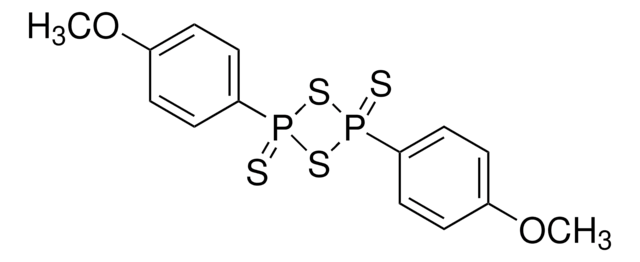All Photos(1)
About This Item
Linear Formula:
KC15N
CAS Number:
Molecular Weight:
66.11
MDL number:
UNSPSC Code:
12352118
PubChem Substance ID:
NACRES:
NA.12
Recommended Products
isotopic purity
98 atom % 15N
Quality Level
form
solid
mp
>300 °C (lit.)
mass shift
M+1
SMILES string
[K]C#[15N]
InChI
1S/CN.K/c1-2;/i2+1;
InChI key
YUZRZFQHUCKACF-CGOMOMTCSA-N
Looking for similar products? Visit Product Comparison Guide
Packaging
This product may be available from bulk stock and can be packaged on demand. For information on pricing, availability and packaging, please contact Stable Isotopes Customer Service.
Signal Word
Danger
Hazard Statements
Precautionary Statements
Hazard Classifications
Acute Tox. 1 Oral - Acute Tox. 2 Dermal - Acute Tox. 2 Inhalation - Aquatic Acute 1 - Aquatic Chronic 1 - Met. Corr. 1 - STOT RE 1
Target Organs
Thyroid
Supplementary Hazards
Storage Class Code
6.1B - Non-combustible acute toxic Cat. 1 and 2 / very toxic hazardous materials
WGK
WGK 3
Flash Point(F)
Not applicable
Flash Point(C)
Not applicable
Choose from one of the most recent versions:
Already Own This Product?
Find documentation for the products that you have recently purchased in the Document Library.
Customers Also Viewed
Xiao-Zhang Yu et al.
Journal of hazardous materials, 225-226, 190-194 (2012-05-29)
A study was conducted to investigate activities of nitrate reductase (NR) and glutamine synthetase (GS) in plants during cyanide metabolism. Young rice seedlings (Oryza sativa L. cv. XZX 45) were grown in the nutrient solutions containing KNO(3) or NH(4)Cl and
Erica M Granjeiro et al.
Autonomic neuroscience : basic & clinical, 167(1-2), 21-26 (2011-12-27)
Several studies from our group have indicated that the BNST play an important role in baroreflex modulation. However, the involvement of the BNST in the chemoreflex activity is unknown. Thus, in the present study, we investigated the effect of the
Anand Kumar et al.
Amino acids, 43(6), 2417-2429 (2012-05-23)
Condensation reactions of amino acid (glycine and alanine) on the surface of metal(II) octacyanomolybdate(IV) (MOCMo) complexes are investigated using high-performance liquid chromatography (HPLC) and electron spray ionizations-mass spectroscopy (ESI-MS). The series of MOCMo have been synthesized and the effect of
Naresh K Sharma et al.
Bioresource technology, 121, 263-273 (2012-08-04)
Present study focused on the degradation of a mixture of phenol, cresol, xylenol, quinoline, and indole along with cyanide, commonly found in coke oven wastewater, using aerobic mixed culture. It was found that xylenol and indole were difficult to degrade
P Lawson-Smith et al.
Undersea & hyperbaric medicine : journal of the Undersea and Hyperbaric Medical Society, Inc, 38(4), 223-237 (2011-09-01)
Cyanide (CN) intoxication inhibits cellular oxidative metabolism and may result in brain damage. Hydroxycobalamin (OHCob) is one among other antidotes that may be used following intoxication with CN. Hyperbaric oxygen (HBO2) is recommended when supportive measures or antidotes fail. However
Our team of scientists has experience in all areas of research including Life Science, Material Science, Chemical Synthesis, Chromatography, Analytical and many others.
Contact Technical Service













